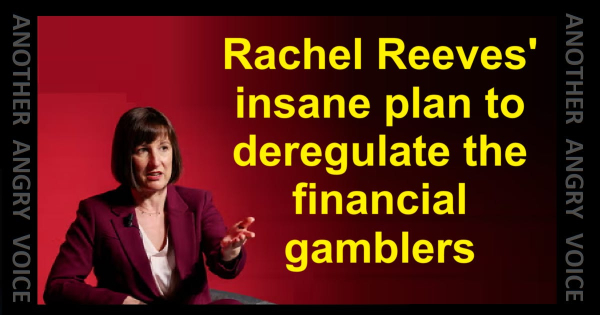Suche
Beiträge, die mit Financial getaggt sind
#law #privacy #Trump #InfoSec #PersonalFinance
Finland in the world press
The article highlights the importance of programs like Yrityskylä, a network of 'business villages' where sixth-grade students (ages 12-13) engage in real-life business simulations.BYTESEU (Bytes Europe)
by Another Angry Voice on Substack
@UKLabour
“City deregulation exploded in Labour's faces in 2008, yet Reeves is ignoring the warnings from history and pushing ahead with plans to deregulate reckless financial sector gamblers again.”
https://open.substack.com/pub/anotherangryvoice/p/rachel-reeves-insane-plan-deregulate-financial-sector-gamblers?r=27oltk&utm_medium=ios
#Press #UK #Labour #Starmer #Reeves #Financial #Deregulation #Reckless #Austerity #Crash2008 #Thatcherism
by James Wright in The Canary @thecanaryuk
@UKLabour
“Of 12 recommendations for government transparency and the lobbying register on Spotlight on Corruption’s ‘scorecard‘, the Tories fully met three, while Labour has fully met just one proposal.”
https://www.thecanary.co/uk/analysis/2024/12/13/labour-corporate-lobbying/?__s=pw3ygmyxve9etudpqdrh
#Press #UK #Labour #Starmer #Lobbying #Transparency #Corruption #Weapons #Climate #Financial #Regulation #Accountability

Labour doing even less than the Tories to stop corporate lobbying
Labour has shockingly committed to even less recommendations on lobbying from the Committee on Standards in Public Life than the Tories didJames Wright (The Canary)
Why does the government not print money?
Addiction
You might be wondering, why not just pay directly? Why this side route through state securities? After all, money spent on interest payments is money not spent on government obligations.
The answer is that paying the interest — which is up to fifteen percent of the US federal budget — is so costly that the government is left with insufficient funds. The answer is more debt. When you can't afford to borrow, the easy solution is to borrow more. The answer is an addiction.
Politicians are placed in an unworkable situation: constituents want lower taxes while the government is expected to provide the same level of service. How to make everyone happy? Borrow money and leave it to some future politician to deal with the debt.
Inflation
The government could print money to discharge its obligations. The question is then, what is to stop politicians from recklessly printing money? What is the natural brake on such a system? It can be the same limit that the central banks observe. When the inflation rate exceeds an arbitrary limit, usually two or three percent, a central banks raises the prime interest rate — the rate at which it lends money to banks — thereby making it more costly for other banks to create money.
Using this as a legal limit, the government would be free to print as much money as it wants, provided that the inflation target is not exceeded. The government still receives taxes, but in this case, extinguishes the money. This is what banks do to money that repays loans that it has made.
Recessions
The bigger the economy grows, the more money the government may create, and this is even desireable. This is a virtuous circle. During a recession, government expenditures would be reduced. This is a vicious circle. The parliament could vote to set aside the limit in order to stimulate growth. Normally, central banks do this, again by adjusting the prime lending rate, but the other banks are notoriously stingy with loans in an uncertain economic environment, because the likelihood of default in a recession is higher. The new money tends to flow toward safe investments, like real estate — but higher housing costs are nothing that workers want or need. The money could go instead to infrastructure projects that create jobs. Where factory campuses are created at government expense, for example, the private cost of building a factory is reduced. The government could even build the factories itself and sell them for a profit when the recession is over. That profit would be removed from circulation (extinguished) in order to reduce inflation, basically paying back the relaxation of the inflation limit. The critical feature is that any additional spending that is not used to discharge obligations (social security, government payrolls, defense, etc.) must be used for infrastructure.
Who decides what infrastructure and where? The government already invests in infrastructure projects and those questions already arise. These questions do not arise due to governments printing money.
Financial Stabilisation
The perversion of the existing system does not end there. The government is the final guarantor of the financial system. When banking recklessness brings about the collapse of a financial institution, the government uses tax dollars to bail the banks out, starting with the biggest. Everyone knows this, and so in a crisis, money tends to flow from small banks to big banks — from the innocent to the guilty — thereby increasing the concentration of money and political influence.
If the government printed its own money, it could allow reckless banks to fail while injecting liquidity among the responsible banks. The small banks would be safe havens. They are, in general, least likely to be involved in derivative trading or risky investments.
#financial crisis #banking crisis #inflation #recession



